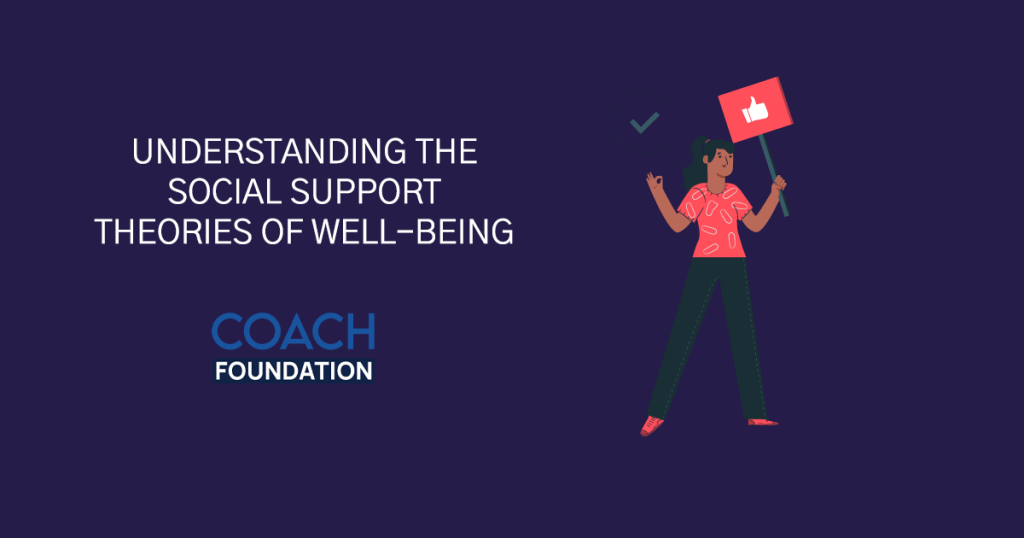Blog » Coaching Models and Techniques » Understanding The Social Support Evaluation Model
The Social Support Theories Of Well-Being
Are you looking to improve your overall well-being? If so, understanding the social support theories of well-being can be a game-changer for you. These theories delve into the importance of having strong social connections and how they contribute to our happiness and health.

By exploring these theories, you’ll gain insight into the benefits of social support as well as the negative effects of isolation on your well-being. In today’s fast-paced world, it’s easy to get caught up in our own lives and forget about the power of human connection. However, research has consistently shown that having a strong social support network is crucial for our well-being.
According to these theories, when we have people around us who care about us and provide emotional, informational, or tangible assistance when needed, we experience higher levels of happiness and life satisfaction.
Not only does social support contribute to positive mental health outcomes such as reduced stress and depression, but it also has physical health benefits like boosting immune function and reducing the risk of chronic diseases.
Key Takeaways
Social support theories emphasize the importance of strong social connections for well-being.
Having a strong social support network contributes to higher happiness and life satisfaction.
Social support has positive mental health outcomes, such as reduced stress and depression.
It also has physical health benefits, like boosting immune function and reducing the risk of chronic diseases.
What are the Social Support Theories of Well-being
So, what exactly are the social support theories of well-being? Well, these theories suggest that having a strong network of social relationships and receiving support from others can have a positive impact on our overall well-being.
Drawing from my experience, I believe that having people who care about us, provide emotional support, and offer practical assistance can help buffer the negative effects of stress and enhance our psychological and physical health.
One aspect of social support theory is the idea that individuals who have a sense of belonging and feel connected to others tend to experience higher levels of happiness and life satisfaction. When we have close friends, family members, or partners who we can rely on and confide in, it fosters a sense of security and fulfillment. This social connectedness helps us cope with challenges more effectively by providing emotional comfort and encouragement.
Another important element of social support theories is the role they play in promoting resilience. Life can throw many curveballs at us, but having a strong support system can help us bounce back from difficult situations.
Knowing there are people we can turn to for guidance or assistance provides us with a sense of control over our lives. Research has shown that individuals with strong social networks are better able to handle adversity and recover more quickly from setbacks.
Understanding the social support theories of well-being highlights the importance of nurturing healthy relationships in order to improve our overall quality of life. Based on my first-hand experience, having supportive connections not only enhances our emotional well-being but also contributes to our ability to navigate through life’s challenges more effectively.
So now let’s explore some specific benefits associated with these theories without delay!
Benefits of Social Support Theories of Well-Being
Imagine how much better your life could be with the added comfort and guidance of friends and loved ones in every aspect. Social support theories of well-being emphasize the numerous benefits that come from having a strong network of social relationships.
1. Social support provides emotional support
It allows you to share your joys and sorrows with others who genuinely care about your well-being. This emotional connection helps alleviate stress, reduce feelings of loneliness, and foster a sense of belonging.
2. Give importance to practical assistance
Having friends or family members who can offer help when needed can make daily life easier and more manageable. Whether it’s lending a hand with household chores, providing transportation during times of need, or offering advice on important decisions, this practical support contributes to overall well-being by reducing stress and increasing self-efficacy.
3. Promotes physical health
Lastly, social support plays a crucial role in promoting physical health. Research has shown that individuals with strong social ties have better physical health outcomes compared to those who are socially isolated.
These benefits may arise from various factors, such as accountability partners for exercise routines or encouragement to adopt healthier lifestyle choices like quitting smoking or maintaining a balanced diet.
As you can see, the benefits of social support theories extend beyond just emotional well-being. Findings show that, from providing emotional connections to offering practical assistance and improving physical health outcomes, having a supportive network positively impacts different aspects of your life.
However, not having access to such support systems can have detrimental effects on one’s well-being. So let’s explore the negative effects of social isolation on well-being next.
Negative Effects of Social Isolation on Well-Being
Feeling lonely and disconnected from others can have devastating consequences for your overall happiness and health. Social isolation has been linked to an increased risk of mental health issues such as depression, anxiety, and even suicidal thoughts.
When you lack social support, it becomes difficult to cope with stressors in life, leading to a decline in your well-being.
Research has shown that social isolation can also negatively impact your physical health. People who are socially isolated are at a higher risk of developing chronic illnesses such as heart disease, high blood pressure, and obesity. This could be because when you’re alone, you may engage in unhealthy behaviors like poor diet choices or a lack of exercise. Additionally, being socially isolated may lead to disrupted sleep patterns and a weakened immune system.
It’s important to recognize the negative effects of social isolation on well-being so that we can take steps to prevent them. Understanding the importance of social connections and actively seeking out opportunities for interaction can greatly improve our overall happiness and health.
Factors such as having supportive family and friends, participating in community activities, or joining clubs or groups with similar interests can all contribute to building a strong social network. By prioritizing social connections in our lives, we can create a support system that enhances our well-being and helps us navigate through life’s challenges with greater resilience.
Conclusion
In summary, social support theories highlight the significant role that interpersonal connections play in promoting well-being. By fostering meaningful relationships and seeking out sources of support when needed, we can enhance our mental health and overall quality of life.
Remember to prioritize building social connections, as they’re crucial for maintaining a healthy sense of belonging and happiness in your life.
When you actively build and nurture your social support network, you create a foundation for emotional stability and resilience. Having people who genuinely care about your well-being provides a sense of belonging and validation. They offer comfort during difficult times and celebrate achievements with you.
By fostering meaningful connections, you’re creating an environment where you feel safe to share your thoughts, feelings, and experiences without judgment or fear of rejection.
Investing time and effort into building social support is not only beneficial but essential for your overall well-being. It’s through these connections that we find solace, encouragement, and a sense of belonging.
So take the knowledge from this discussion on strategies for building social support and apply it in your own life by actively seeking out opportunities to connect with others.
Frequently Asked Questions (FAQs)
What is the importance of social support for mental health?
You can’t underestimate the significance of social support in maintaining good mental health. Having a strong network of friends, family, and loved ones who are there for you during difficult times can make all the difference in the world.
When you have people to lean on and talk to, it helps alleviate feelings of loneliness, isolation, and stress. Social support provides a sense of belonging and validation, reminding you that you’re not alone in your struggles.
Through regular interactions with supportive individuals, you gain a greater sense of self-worth and confidence. This positive reinforcement helps improve your mental resilience and coping mechanisms when faced with challenges.
What are some strategies for building social support networks?
One powerful way to strengthen your network of friends and loved ones is by actively seeking out opportunities for connection and fostering meaningful relationships. Start by reaching out to acquaintances or colleagues who share common interests or hobbies.
Additionally, attending community events such as festivals, workshops, or volunteering opportunities can also help you expand your social circle and create new connections.
Another effective strategy is to use technology to your advantage. Social media platforms offer various ways to connect with others who share similar interests or backgrounds.
How can one overcome social isolation?
To overcome social isolation, it’s imperative to actively seek out opportunities for connection and foster meaningful relationships.
Start by reaching out to friends and family members who you haven’t spoken to in a while. Schedule regular catch-up calls or video chats to maintain a sense of closeness.
Additionally, consider joining clubs or organizations that align with your interests. This will allow you to meet like-minded individuals who share common hobbies or passions.
Another effective way to overcome social isolation is by participating in community events or volunteering activities. These provide opportunities to meet new people and contribute positively to society at the same time.
Engaging in group activities such as sports teams, book clubs, or art classes can also help combat loneliness. By participating in these activities, you not only have the chance to form connections but also engage in enjoyable and fulfilling experiences.

ABOUT SAI BLACKBYRN
I’m Sai Blackbyrn, better known as “The Coach’s Mentor.” I help Coaches like you establish their business online. My system is simple: close more clients at higher fees. You can take advantage of technology, and use it as a catalyst to grow your coaching business in a matter of weeks; not months, not years. It’s easier than you think.
AS SEEN ON





